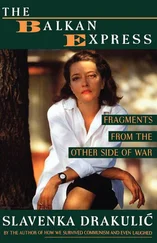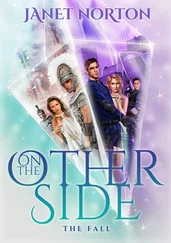The Other Side of You
Salley Vickers
FOURTH ESTATE • London
For Xopher
Who is the third who walks always beside you?
When I count, there are only you and I together
But when I look ahead up the white road
There is always another one walking beside you
…
—But who is that on the other side of you?
The Waste Land , T. S. ELIOT
Cover Page
Title Page The Other Side of You Salley Vickers FOURTH ESTATE • London
Dedication For Xopher
Epigraph Who is the third who walks always beside you? When I count, there are only you and I together But when I look ahead up the white road There is always another one walking beside you … —But who is that on the other side of you? The Waste Land , T. S. ELIOT
Part I Part I When I count, there are only you and I together
1
2
3
4
5
6
7
8
9
10
11
Part II
1
2
3
4
5
6
7
8
9
10
11
12
13
Part III
1
2
3
4
5
Part IV
1
2
3
4
Acknowledgements
Also by Salley Vickers
Copyright
About the Publisher
When I count, there are only you and I together
SHE WAS A SLIGHT WOMAN, PALE, WITH TWO WINGS OF DARK hair which framed her face and gave it the faintly bird-like quality that characterised her person. Even at this distance of time, which has clarified much that was obscure to me, I find her essence hard to capture. She was youthful in appearance but there was also an air of something ambiguous about her which was both intriguing and daunting.
When we met she must have been in her forties, but in a certain light she could have been fourteen or four hundred—though when I say ‘light’ I perhaps mean that subtle light of the mind, which casts as many shadows as it illuminates but in the right conditions can reveal a person’s being more accurately than the most powerful beam.
Once I would have known her age to the day, since it would have been part of the bald list of information on her medical file: name, sex, date of birth. Of the last detail I have a hazy recollection that her birthday was in September. She spoke of it once in connection with the commencement of the school year and a feeling that, in the coincidence of the month of her birth and a new term, she might begin some new life. ‘You see, Doctor,’ —when she used my title she did so in a tone that located it at a fine point between irony and intimacy—‘even as a child I must have been looking for a fresh start.’
Doctors are like parents: there should be no favourites. But doctors and parents are human beings first and it is impossible to escape altogether the very human fact that certain people count. Of course everyone must, or should, count. We oughtn’t do what we do if that isn’t a fundamental of our instincts as well as of our professional dealings. But the peculiar spark that directs us towards our profession will have its own particular shape. I have had colleagues who come alive at a certain kind of raving, who perceive in the voices of the incurable schizophrenic a cryptic language, a Linear B, awaiting their special aptitude for decoding. One of my formidably brilliant colleagues has spent her life attempting to unravel the twisted minds of the criminally insane. It’s my opinion no one could ever disentangle that knot of evil and sickness, but for her it is the grail that infuses her work with the ardour of a mythic quest. My colleague, Dan Buirski, had a bee in his bonnet about eating disorders. I used to kid him, a long cadaver of a man himself, that he liked nothing more than a starving young woman to get his teeth into. I said once, ‘You’re no example, you’re a mere cheese paring yourself,’ and he laughed and said, ‘That’s why I understand them.’ He’s lucky with his metabolism, but his grandmother and his two uncles died in Treblinka. Starvation is in his blood and he’s converted that inheritance into a consuming interest in humankind’s relationship with food. It’s a strange business, ours.
And what was my peculiar bent, the glimmer in my eye which has in it the capacity to lead me into dangerous swamps and mires? For me it was the denizens of that hinterland where life and death are sister and brother, the suicidally disposed, who beckoned. Like is drawn to like. Alter the biographical circumstances a fraction and my colleague who worked with psychopaths would make an expert serial killer: she had just the right streak of fanatical perfectionism and the necessary pane of ice in the heart. And for all his badinage, Dan had a hard time keeping a scrap of flesh on him. I saw him once, after he’d had a bad bout of flu, and I nearly crossed myself he looked so like a vampire’s victim. But despite the concentration camps, death wasn’t his particular lure. That was my province.
It was a landscape I knew with that innate sense which people call ‘sixth’, with the invisible antennae that register the impalpable as no less real than a kick in the solar plexus from a startled horse. To some of us it can be more real. It is said that the dead tell no tales, but I wonder. When I was five, my brother, Jonathan, was killed by an articulated lorry. It was my third day of school and our mother was unwell; and because our school was close by, and my brother was advanced for his six and a half years, and was used to going to and from school alone, she allowed him to take me there unescorted. The one road we had to cross was a minor one but the lorry driver had mistaken his way and was backing round the corner as a preliminary to turning round. Jonny had stepped off the pavement and had his back to the lorry to beckon me across. Although he was mature for his age he was small, too small to figure in the mirror’s sight lines. I was on the pavement and I watched him vanish under the reversing lorry and I seem to remember—though this could be the construction of hindsight—that it was not until the vehicle started forward that I heard a thin, high scream, the sound I imagine a rabbit might make as a trap springs fatally on fragile bones.
I doubt there was a bone left unbroken in my brother’s body when the lorry drove off, leaving the mess of shattered limbs and blood and skin which had been Jonny. I believe I saw what was left of him, before I was whirled away in the big, freckled arms of Mrs Whelan, who lived across the street and had heard the scream and rushed me into her house, which Jonny and I had never liked because it smelled of dismally cooked food, and terrified me by falling on her knees and dragging me down with a confused screech, ‘Jesus, Mary and Joseph, the blessed lamb, may he rest in peace.’
Afterwards, I didn’t know where my brother was but I was pretty sure it wasn’t with Jesus, Mary or Joseph. The belief I clung to was that Jonny was still in the pine tree he had assured me was ‘magic’, on whose stately curving boughs we used to swing together in Chiswick Park. I heard him more than once, when I was allowed back to play there. He was singing ‘He’ll be coming round the mountain when he comes’, which was the song our mother sang when we were fretful, the two of us, on long car journeys. Later, when Mother had my twin sisters, born one behind the other within the hour, she sang other songs to them.
From that time onwards, it was always ‘the girls’ and ‘Davey’. I, Davey, was the wrong side of the unbridgeable fissure that had opened up in our family, and although I’m sure my parents loved me I was a reminder of that small bloody mess they’d left behind. The lorry driver never recovered and had to be pensioned off, unfit for work. But my mother was made of sterner stuff. She had in her a fund of life that was not to be defeated even by life’s only real enemy. She was not a woman who lived on easy terms with her emotions. She was the daughter of a judge and her upbringing, though liberal, had not bred in her a place for the easy expression of the finer shades of feeling. And I knew, too, though nothing in her outward demeanour ever gave this away, that if she could have chosen which son she had to lose it would not have been Jonny.
Читать дальше












